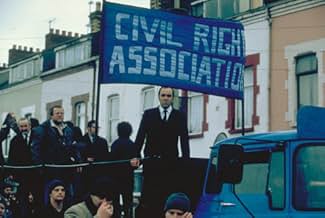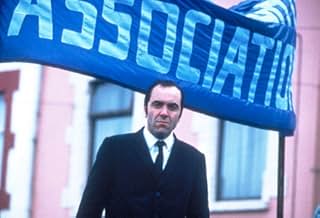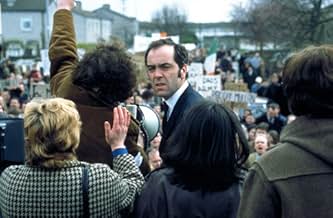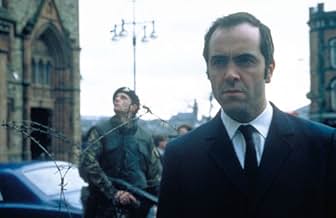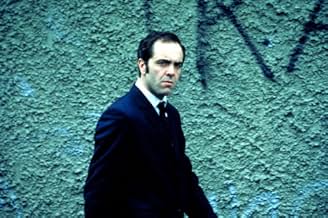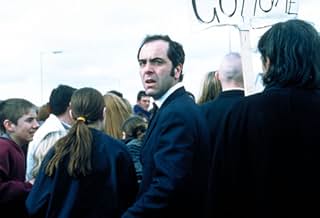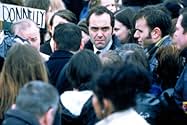IMDb-BEWERTUNG
7,6/10
26.301
IHRE BEWERTUNG
Eine Dramatisierung der irischen Bürgerrechtsprotestmärsche und deren blutige Niederschlagung durch die britische Armee am 30. Januar 1972.Eine Dramatisierung der irischen Bürgerrechtsprotestmärsche und deren blutige Niederschlagung durch die britische Armee am 30. Januar 1972.Eine Dramatisierung der irischen Bürgerrechtsprotestmärsche und deren blutige Niederschlagung durch die britische Armee am 30. Januar 1972.
- Regie
- Drehbuch
- Hauptbesetzung
- 1 BAFTA Award gewonnen
- 19 Gewinne & 23 Nominierungen insgesamt
Carmel McCallion
- Bridget Bond
- (as Carmel Mccallion)
Christopher Villiers
- Maj. Steele
- (as Chris Villiers)
Empfohlene Bewertungen
I have seen "Bloody Sunday" twice now - once on the big screen and once on DVD - and read Don Mullen's book, "Eyewitness Bloody Sunday." This movie is a very realistic depiction of the defining moment of the "troubles" in Northern Ireland. The hand-held cameras and grainy film style make it feel more like a documentary than a movie, which of course is the intent. As another reviewer has mentioned, the acting is very natural throughout. It does take some time to get started, but once the the shooting starts it hits the viewer like a sledgehammer. Very powerful.
The film jumps so frequently from scene to scene that at times it is distracting, though I was much less annoyed by this the second time around. And, having seen it once with and once without subtitles, I must say that although the subtitles (optional on the DVD) are intrusive they are quite welcome. I love the Irish accent but at times it can be difficult for me to decipher,and much of the dialogue in the movie is muted. It was good to know what was being said.
As for the objectivity, of course the movie is slanted - so was the situation. But it is not unreasonably slanted. The British are not shown as one-dimensional demons - in particular, Nicholas Farrell does a great job of conveying Brigadier Mclellan's ambiguity and even disapproval of the course taken against his wishes by the supposed "Observer," Maj. Gen. Ford (who, if the movie has a villain, is the prime candidate.) At one point early on several Paras are discussing the day's prospects, and reveal how tired they are of being harassed, shot at and otherwise abused by the native population. This makes the day's events more understandable. This does not EXCUSE the cold-blooded gunning down of 27 people - there is no excuse for that - but at least one can see a contributing factor. And protesters are shown, once or twice, firing back. (The key here is firing BACK - evidence indicates that no marchers fired until the first two protesters were wounded. And those scattered few that attempted return fire were quickly dissuaded by their countrymen. Later in the day the IRA did go into action, but not until after the bloodletting in Bogside was over with.) Ivan Cooper's (James Nesbitt) words at the close of the film were shown to be all too true in the years since the actual incident. The IRA was on unsteady legs at the time, but has never lacked support since January 30, 1972.
The film is a powerful object lesson concerning the misuse of force, and one that governments everywhere - including my own country, the United States - should take to heart. It has a few flaws, but I think deserves the awards it has received. 8/10 points.
The film jumps so frequently from scene to scene that at times it is distracting, though I was much less annoyed by this the second time around. And, having seen it once with and once without subtitles, I must say that although the subtitles (optional on the DVD) are intrusive they are quite welcome. I love the Irish accent but at times it can be difficult for me to decipher,and much of the dialogue in the movie is muted. It was good to know what was being said.
As for the objectivity, of course the movie is slanted - so was the situation. But it is not unreasonably slanted. The British are not shown as one-dimensional demons - in particular, Nicholas Farrell does a great job of conveying Brigadier Mclellan's ambiguity and even disapproval of the course taken against his wishes by the supposed "Observer," Maj. Gen. Ford (who, if the movie has a villain, is the prime candidate.) At one point early on several Paras are discussing the day's prospects, and reveal how tired they are of being harassed, shot at and otherwise abused by the native population. This makes the day's events more understandable. This does not EXCUSE the cold-blooded gunning down of 27 people - there is no excuse for that - but at least one can see a contributing factor. And protesters are shown, once or twice, firing back. (The key here is firing BACK - evidence indicates that no marchers fired until the first two protesters were wounded. And those scattered few that attempted return fire were quickly dissuaded by their countrymen. Later in the day the IRA did go into action, but not until after the bloodletting in Bogside was over with.) Ivan Cooper's (James Nesbitt) words at the close of the film were shown to be all too true in the years since the actual incident. The IRA was on unsteady legs at the time, but has never lacked support since January 30, 1972.
The film is a powerful object lesson concerning the misuse of force, and one that governments everywhere - including my own country, the United States - should take to heart. It has a few flaws, but I think deserves the awards it has received. 8/10 points.
I thought this was an amazing movie.
Now I learned about this in school for a while and as an Englishman I do feel a certain, oblique connection to the troubles. I didn't realise this kind of thing could happen among my compatriots (I'm not trying to belittle Irish Nationalism by calling the Northern Irish my compatriots, it's just how I have come to see them), and I hadn't realised I'd thought this way. It was a real consciousness raiser for me.
My biases notwithstanding, this movie is as a hypnotic account of a confusing episode of an even more confusing time. It has the task of representing the mindset of the times, the mindsets, I should say, while still making it into a spontaneous narrative.
I'm not an expert so I cannot vouch for the authenticity of any of this, but I feel I can believe all of it. There is a tendency for us to demarcate history from real life. A million deaths is a statistic as Stalin said. But here I really feel history and the lives of regular people converge in a devastating way.
At its heart I suppose the movie is a mystery. Not so much who-done-it but a why-did-it. I really felt while I was watching, all the chaos and threat that leads to tragedy while still feeling baffled and disorientated throughout. It feels like a documentary. The dialogue is spontaneous but still rich with nuance. The cinematography is candid and even shaky, giving it an often hypnotic, Blair Witch quality.
A movie to never forget.
Now I learned about this in school for a while and as an Englishman I do feel a certain, oblique connection to the troubles. I didn't realise this kind of thing could happen among my compatriots (I'm not trying to belittle Irish Nationalism by calling the Northern Irish my compatriots, it's just how I have come to see them), and I hadn't realised I'd thought this way. It was a real consciousness raiser for me.
My biases notwithstanding, this movie is as a hypnotic account of a confusing episode of an even more confusing time. It has the task of representing the mindset of the times, the mindsets, I should say, while still making it into a spontaneous narrative.
I'm not an expert so I cannot vouch for the authenticity of any of this, but I feel I can believe all of it. There is a tendency for us to demarcate history from real life. A million deaths is a statistic as Stalin said. But here I really feel history and the lives of regular people converge in a devastating way.
At its heart I suppose the movie is a mystery. Not so much who-done-it but a why-did-it. I really felt while I was watching, all the chaos and threat that leads to tragedy while still feeling baffled and disorientated throughout. It feels like a documentary. The dialogue is spontaneous but still rich with nuance. The cinematography is candid and even shaky, giving it an often hypnotic, Blair Witch quality.
A movie to never forget.
Obviously an important day in history, and the events of that day are breathtakingly conveyed by the best Docudrama filmmaker we have, Paul Greengrass, Before we Knew who he was-and that may have made a certain difference in my experience of the film-it was more exhilarating (and impressive) before Greengrass had made a name for himself at this kind of documentary-styled filmmaking. This one, when it came out, definitely gave me goosebumps....todd gold
Although initially difficult to get into, Bloody Sunday proved worthwhile persevering, as the latter half puts the viewer in the carnage.
The acting, especially James Nesbit is excellent, the recreation of the mood is superb although it was obvious with the constant close ups that there was very little budget to recreate the scenery. The geography was never explained and therefore would leave a viewer without prior knowledge of the area disorientated.
The documentary suffered from not being able to set the scene, a lot had happened in the week prior to the Civil Rights march that put both the participants and the security forces on edge and made the advance more significant. The question of why the Paras were sent to Derry were never fully explored.
Overall it was flawless recreation of events from the point of view taken by the film makers on this particular incident. It is worth noting that this is based on the Irish Governments review of the Widgery report into Bloody Sunday. (NB the Widgery report is mostly considered by nationalists to be a white wash)
The acting, especially James Nesbit is excellent, the recreation of the mood is superb although it was obvious with the constant close ups that there was very little budget to recreate the scenery. The geography was never explained and therefore would leave a viewer without prior knowledge of the area disorientated.
The documentary suffered from not being able to set the scene, a lot had happened in the week prior to the Civil Rights march that put both the participants and the security forces on edge and made the advance more significant. The question of why the Paras were sent to Derry were never fully explored.
Overall it was flawless recreation of events from the point of view taken by the film makers on this particular incident. It is worth noting that this is based on the Irish Governments review of the Widgery report into Bloody Sunday. (NB the Widgery report is mostly considered by nationalists to be a white wash)
Normally I don't enjoy the handheld documentary style films, as they tend to induce waves of nausea, but Bloody Sunday had me riveted from the word go. That we already know how it's going to end is irrelevant, the pressure building on the day of the march is almost unbearable. Though there's been criticism that the film is slanted towards the republican point of view, I found it balanced, even in the depiction of the soldiers and officers. Everybody certainly looked the part and I went away feeling some sympathy for both sides. Given the close quarters and inflammatory nature of the conflict, it's amazing that bloodbaths like this (soldiers blasting civilians) haven't happened more often in Northern Ireland. It's only now, that retired soldiers have broken ranks and talked about what actually happened, that a film like this can see the light of day.
Wusstest du schon
- WissenswertesTo make this movie as authentic as possible, no lights were used in the movie and the camera work was entirely hand-held
- PatzerThe marchers carry homemade cardboard signs with slogans written on them. When shown from behind, some have modern printing ("Made in China") on them that are not appropriate for 1972.
- Zitate
Ivan Cooper: I just want to say this to the British Government... You know what you've just done, don't you? You've destroyed the civil rights movement, and you've given the IRA the biggest victory it will ever have. All over this city tonight, young men... boys will be joining the IRA, and you will reap a whirlwind.
- Crazy CreditsThe live rendition of U2's Sunday, Bloody Sunday continues to play for a full three minutes over a black screen after the credits finish rolling.
- VerbindungenFeatured in The 2003 IFP Independent Spirit Awards (2003)
Top-Auswahl
Melde dich zum Bewerten an und greife auf die Watchlist für personalisierte Empfehlungen zu.
Details
- Erscheinungsdatum
- Herkunftsländer
- Sprache
- Auch bekannt als
- Domingo sangriento
- Drehorte
- Produktionsfirmen
- Weitere beteiligte Unternehmen bei IMDbPro anzeigen
Box Office
- Budget
- 2.000.000 £ (geschätzt)
- Bruttoertrag in den USA und Kanada
- 773.228 $
- Eröffnungswochenende in den USA und in Kanada
- 29.419 $
- 6. Okt. 2002
- Weltweiter Bruttoertrag
- 1.758.689 $
- Laufzeit1 Stunde 51 Minuten
- Farbe
- Sound-Mix
- Seitenverhältnis
- 1.85 : 1
Zu dieser Seite beitragen
Bearbeitung vorschlagen oder fehlenden Inhalt hinzufügen


